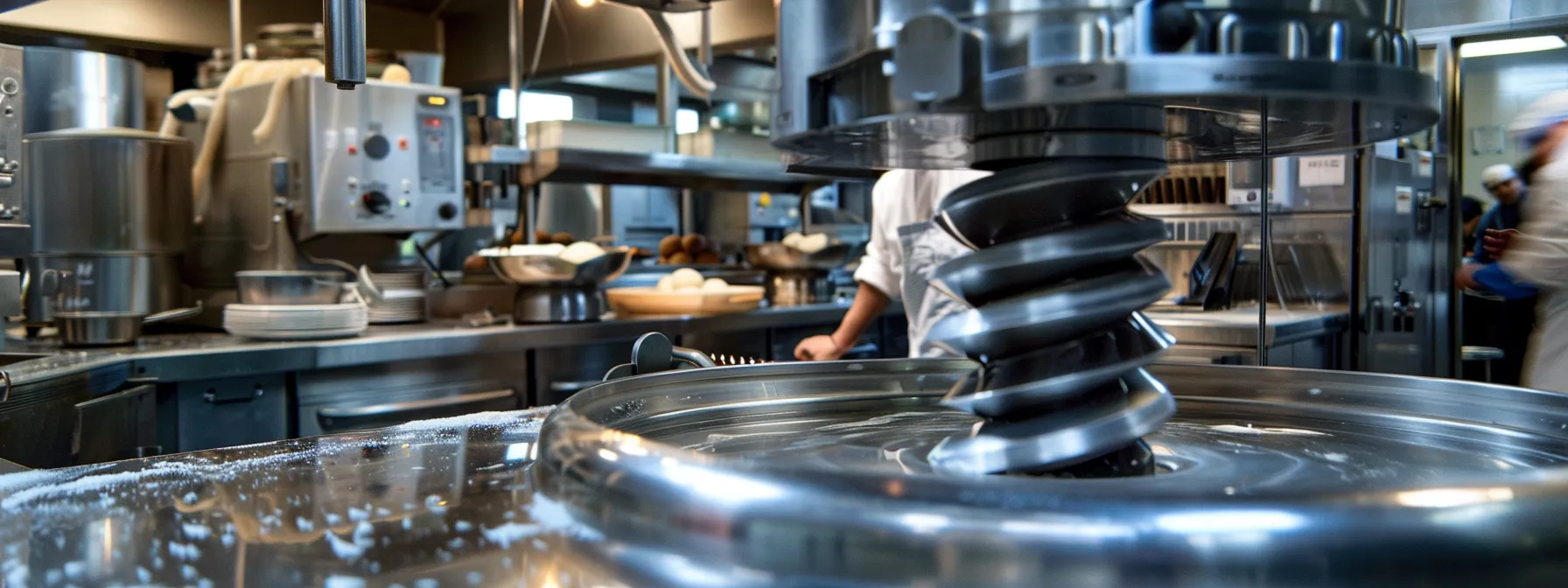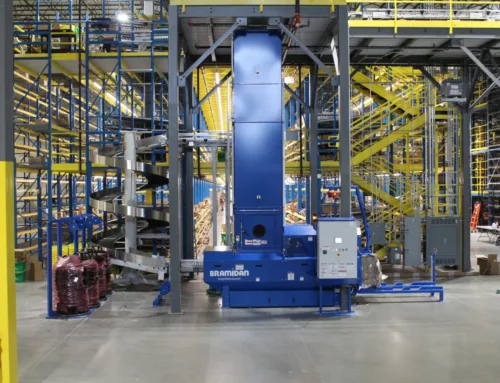
Choosing the right commercial dough mixer can significantly impact your bakery’s efficiency and product quality. Are you unsure whether a commercial spiral mixer or a planetary model is best for your needs? In this article, I will explore the features and advantages of both types of mixers, helping you determine which machine suits your operations. By understanding the benefits of each model, you can make an informed decision that enhances your dough mixing process and ultimately improves your bakery’s output. Let’s address the common challenges you face in selecting the right equipment for your business.
The Critical Role of Choosing the Right Commercial Dough Mixer

Choosing the right commercial dough mixer from End2End Logix is crucial for any baker. The type of mixer, whether spiral or planetary, directly impacts dough quality and consistency, influencing production efficiency and output. Additionally, the right mixer allows for greater product variety and innovation while also considering cost implications. Understanding these factors will guide you in making an informed decision for your foodservice operation. Contact Us for more information on Deli Equipment, Display Coolers, and Condensers Overview.
Impact on Dough Quality and Consistency
The choice between a spiral or planetary dough mixer significantly affects the quality and consistency of the dough produced in a bakery. Spiral mixers are particularly effective for kneading large batches of dough, ensuring even hydration of flour and optimal gluten development, which is essential for achieving the desired texture in bread and pastry. On the other hand, planetary mixers excel in versatility, allowing for various attachments that can handle different types of baking tasks, from whipping cream to mixing delicate pastry dough, thus catering to a wider range of baking needs.
Influence on Production Efficiency and Output
The choice of a commercial dough mixer can significantly influence production efficiency and output in a bakery. For instance, spiral mixers, with their robust steel gears, are designed to handle large volumes of dough quickly, allowing for faster batch processing. This efficiency not only saves time but also ensures consistent results, which is crucial for maintaining product quality. On the other hand, planetary mixers made from stainless steel offer versatility, enabling bakers to switch between different attachments for various tasks, thus maximizing the use of a single piece of equipment while ensuring easy sanitation between uses.
Effects on Product Variety and Innovation
The right commercial dough mixer can significantly enhance product variety and innovation in your bakery. For instance, a Hobart spiral mixer allows for the efficient mixing of dough with minimal friction, which is essential for maintaining the integrity of the ingredients. This capability enables bakers to experiment with different batters and recipes, from artisan breads to specialty pastries, all while ensuring consistent results across various products.
- Choosing the right mixer impacts dough quality and consistency.
- Spiral mixers are ideal for large batches and gluten development.
- Planetary mixers offer versatility with various attachments.
- Production efficiency is enhanced with robust equipment.
- Innovative recipes can be developed with the right tools.
Cost Implications of Mixer Selection
When selecting a commercial baking mixer, understanding the cost implications is essential for any bakery owner. Investing in a high-quality commercial bread mixer or a versatile planetary mixer can lead to significant long-term savings by improving dough consistency and reducing waste. For example, a reliable mixer ensures optimal gluten development in cookie dough, which can enhance product quality and customer satisfaction, ultimately driving sales and profitability.
- Choosing the right mixer impacts dough quality and consistency.
- Spiral mixers are ideal for large batches and gluten development.
- Planetary mixers offer versatility with various attachments.
- Production efficiency is enhanced with robust equipment.
- Innovative recipes can be developed with the right tools.
Choosing the right mixer is just the beginning. Now, let’s explore the spiral dough mixer, a tool that brings efficiency and quality to your kitchen.
Spiral Dough Mixers: Features and Advantages

Spiral dough mixers are designed with unique operational mechanics that make them ideal for producing high-quality bread and pizza dough. Their efficient mixing process enhances gluten development, resulting in superior texture. Additionally, these mixers are energy-efficient, providing excellent performance for large batches. However, it’s important to consider their limitations, such as size and specific use cases. In the following sections, I will delve into these features and advantages, highlighting how they align with your Bakery Equipment needs.
Operational Mechanics of Spiral Mixers
The operational mechanics of spiral mixers are designed to optimize dough mixing for high-quality results. These mixers feature a spiral-shaped hook that rotates around a stationary bowl, allowing for efficient kneading and thorough incorporation of ingredients. This design not only enhances gluten development but also minimizes friction, which is crucial for maintaining the integrity of the dough, especially when working with large batches.
- Spiral-shaped hook ensures efficient kneading.
- Rotating hook and stationary bowl design enhances gluten development.
- Minimized friction maintains dough integrity.
- Ideal for large batch production.
- Supports consistent results across various dough types.
Benefits for Bread and Pizza Dough
Spiral dough mixers offer significant advantages for producing bread and pizza dough, primarily due to their efficient mixing capabilities. The design of the spiral hook allows for optimal gluten development, which is essential for achieving the desired texture and structure in both bread and pizza crusts. In my experience, using a spiral mixer not only enhances the quality of the dough but also streamlines the mixing process, enabling bakers to handle larger batches without compromising on consistency or quality.
Energy Efficiency and Performance
Spiral dough mixers are known for their energy efficiency, which is a significant advantage for bakeries looking to optimize operational costs. Their design allows for effective mixing with minimal energy consumption, making them ideal for high-volume production. In my experience, using a spiral mixer not only reduces electricity costs but also enhances overall performance, as these machines can handle large batches without overheating or losing efficiency.
- Spiral mixers are energy-efficient, reducing operational costs.
- Effective mixing with minimal energy consumption.
- Ideal for high-volume production without overheating.
- Enhances overall performance in commercial bakeries.
Limitations and Considerations for Spiral Mixers
While spiral mixers offer numerous advantages, there are limitations to consider. Their size can be a constraint in smaller kitchens, as they often require more floor space compared to planetary mixers. Additionally, spiral mixers are primarily designed for specific dough types, which may limit their versatility for bakers who need to handle a wider range of mixing tasks. Understanding these factors is essential when deciding if a spiral mixer aligns with your bakery’s operational needs.
Spiral dough mixers excel in efficiency and consistency, but there’s more to explore. Planetary dough mixers offer unique benefits and versatile applications that can elevate your baking process.
Planetary Dough Mixers: Benefits and Applications

Planetary dough mixers operate with a rotating bowl and various attachments, making them versatile for different dough types. They excel in producing pastries and confectionery, offering unique advantages for delicate recipes. However, I will also address potential drawbacks, such as limitations in handling large batches. Understanding these aspects will help you determine if a planetary mixer fits your bakery’s needs.
How Planetary Mixers Work
Planetary mixers operate by rotating a mixing bowl while the mixing attachment moves in a planetary motion, allowing for thorough mixing of ingredients. This design enables bakers to use various attachments, such as whisks and paddles, making it suitable for a wide range of applications, from whipping cream to mixing delicate pastry dough. In my experience, this versatility is invaluable in a busy bakery, as it allows for quick adjustments to different recipes without the need for multiple machines.
- Planetary mixers rotate the bowl while the attachment moves in a planetary motion.
- They accommodate various attachments for different mixing tasks.
- This versatility is essential for handling diverse recipes efficiently.
Versatility Across Various Dough Types
Planetary dough mixers are incredibly versatile, making them an excellent choice for bakeries that require flexibility in their operations. With the ability to accommodate various attachments, these mixers can handle a wide range of dough types, from thick bread dough to light pastry mixtures. In my experience, this adaptability allows bakers to efficiently switch between tasks, ensuring that they can meet diverse customer demands without the need for multiple machines.
- Planetary mixers can handle various dough types effectively.
- They accommodate different attachments for specific mixing tasks.
- This versatility enhances operational efficiency in busy bakeries.
Advantages for Pastries and Confectionery
Planetary dough mixers are particularly advantageous for producing pastries and confectionery due to their ability to handle delicate mixtures with precision. The versatility of these mixers allows me to switch between various attachments, such as whisks and paddles, which is essential for achieving the right texture in items like meringues and cream fillings. This adaptability not only streamlines my workflow but also ensures that I can consistently deliver high-quality pastries that meet customer expectations.
- Planetary mixers excel in handling delicate pastry mixtures.
- Various attachments allow for precise mixing of different recipes.
- Streamlined workflow enhances efficiency in pastry production.
- Consistent results lead to high-quality pastries and confectionery.
Potential Drawbacks of Planetary Mixers
While planetary mixers offer versatility and adaptability, they do have some limitations that bakery owners should consider. One significant drawback is their capacity; planetary mixers typically handle smaller batches compared to spiral mixers, which can slow down production in high-demand situations. Additionally, the design may not be as effective for heavy doughs, which can lead to inconsistent results if not monitored closely. Understanding these limitations is essential for making an informed decision about the right mixer for your bakery’s specific needs:
- Planetary mixers may have limited batch capacity.
- They can struggle with heavy doughs, affecting consistency.
- Monitoring is crucial to ensure optimal results.
Now that we understand the strengths of planetary dough mixers, it’s time to consider another option. Spiral mixers offer unique advantages, and comparing them to planetary mixers will help you find the best fit for your bakery.
Spiral vs. Planetary Mixers: Determining the Best Fit for Your Bakery

When choosing between spiral and planetary mixers, I focus on assessing my bakery’s specific needs. Evaluating the types of dough and recipes I work with is essential, as is considering batch sizes and production volume. Additionally, analyzing operational costs and efficiency helps me determine which mixer will best support my bakery’s goals and enhance productivity.
In the following sections, I will delve into these critical factors, providing insights that will guide you in selecting the right commercial dough mixer for your operations.
Assessing Your Bakery’s Specific Needs
When assessing my bakery’s specific needs, I consider the types of products I plan to produce and the volume of dough I typically handle. For instance, if I focus on artisan breads that require extensive gluten development, a spiral mixer may be the best choice due to its efficiency with large batches. Conversely, if my operations involve a variety of delicate pastries and smaller batches, a planetary mixer would provide the versatility needed to accommodate different recipes and attachments, ensuring I can meet diverse customer demands effectively.
Evaluating Dough Types and Recipes
When evaluating dough types and recipes, I focus on the specific requirements of each product I plan to create. For instance, if my bakery specializes in artisan breads that demand extensive gluten development, a spiral mixer is often the best choice due to its ability to handle large batches efficiently. Conversely, for delicate pastries that require precision and versatility, a planetary mixer allows me to switch attachments easily, ensuring I can adapt to various recipes without compromising quality.
- Assess the specific dough types you will be working with.
- Consider the batch sizes required for your production needs.
- Evaluate the versatility needed for different recipes and attachments.
- Determine the importance of gluten development for your products.
- Choose a mixer that aligns with your bakery’s specialty and operational goals.
Considering Batch Sizes and Production Volume
When considering batch sizes and production volume, I find it essential to match the mixer to my bakery’s specific output needs. For high-volume operations, spiral mixers are often the preferred choice due to their ability to efficiently handle large batches, ensuring consistent dough quality across production runs. In contrast, if my bakery focuses on smaller, varied batches, a planetary mixer provides the flexibility needed to switch between different recipes and attachments, allowing me to adapt quickly to customer demands without sacrificing quality.
Analyzing Operational Costs and Efficiency
When analyzing operational costs and efficiency, I find it essential to consider both the initial investment and the long-term savings associated with each type of mixer. Spiral mixers, while often more expensive upfront, can lead to reduced energy costs and improved productivity due to their ability to handle large batches efficiently. In contrast, planetary mixers may have a lower purchase price, but their capacity limitations can result in longer mixing times and potentially higher labor costs, especially in high-demand situations. Understanding these financial implications helps me make a more informed decision that aligns with my bakery’s operational goals.
Every bakery has its own needs. Understanding what to consider when selecting a commercial dough mixer will help you make the right choice.
Essential Considerations When Selecting a Commercial Dough Mixer

When selecting a commercial dough mixer, I focus on several essential factors. Capacity and size requirements are crucial to ensure the mixer fits my production needs. I also consider power, speed, and control features that enhance mixing efficiency. Build quality and durability are vital for long-term use, while ease of use and cleaning can significantly impact daily operations. Finally, I evaluate my budget and potential return on investment to make a sound financial decision.
Capacity and Size Requirements
When selecting a commercial dough mixer, capacity and size requirements are critical factors to consider. I always assess the volume of dough I typically produce to ensure the mixer can handle my bakery’s demands without compromising quality. For instance, if I frequently work with large batches of bread dough, a spiral mixer with a higher capacity is essential, while a planetary mixer may be more suitable for smaller, varied batches of pastries.
- Assess the volume of dough typically produced.
- Choose a mixer that can handle your bakery’s demands.
- Consider a spiral mixer for large batches and a planetary mixer for smaller, varied batches.
Power, Speed, and Control Features
When selecting a commercial dough mixer, I prioritize power, speed, and control features to ensure optimal performance in my bakery. A powerful motor is essential for handling dense doughs, especially in spiral mixers, where consistent mixing is crucial for gluten development. Additionally, adjustable speed settings allow me to tailor the mixing process to different dough types, ensuring that I achieve the desired texture and consistency for each product, whether it’s a robust bread or a delicate pastry.
Build Quality and Durability
When selecting a commercial dough mixer, I prioritize build quality and durability to ensure long-term performance in my bakery. A well-constructed mixer, whether spiral or planetary, should feature robust materials that can withstand the rigors of daily use, minimizing the risk of breakdowns and costly repairs. For instance, I often choose mixers with stainless steel components, as they not only enhance durability but also facilitate easier cleaning, which is essential for maintaining hygiene in a foodservice environment.
Ease of Use and Cleaning
When selecting a commercial dough mixer, ease of use and cleaning are critical factors that can significantly impact daily operations in my bakery. I prefer mixers that feature user-friendly controls and straightforward assembly, as this allows my team to operate them efficiently without extensive training. Additionally, I look for models with removable parts and smooth surfaces, which simplify the cleaning process and help maintain hygiene standards in a foodservice environment:
- User-friendly controls enhance operational efficiency.
- Removable parts facilitate easy cleaning and maintenance.
- Smooth surfaces help maintain hygiene standards.
Budget and Return on Investment
When considering the budget for a commercial dough mixer, I focus on both the initial purchase price and the long-term return on investment. Investing in a high-quality spiral or planetary mixer can lead to significant savings over time by improving dough consistency and reducing waste, which ultimately enhances product quality and customer satisfaction. For example, while a spiral mixer may have a higher upfront cost, its efficiency in handling large batches can result in lower energy costs and increased productivity, making it a worthwhile investment for my bakery.
The right dough mixer can change everything in a bakery. Let’s look at how these machines make daily operations smoother and more efficient.
Real-Life Applications: How the Right Mixer Enhances Bakery Operations

In this section, I will share success stories from bakeries that have effectively utilized spiral mixers to enhance their operations. I will also highlight examples of how planetary mixers have boosted productivity in various settings. Additionally, I will discuss valuable lessons learned from mixer upgrades and provide expert tips on making the best choice for your bakery’s needs.
Success Stories From Bakeries Using Spiral Mixers
In my experience working with bakeries that have adopted spiral mixers, I’ve seen remarkable improvements in both efficiency and product quality. For instance, one local artisan bakery reported that switching to a spiral mixer allowed them to increase their production capacity by 30%, enabling them to meet growing customer demand for their signature breads. The consistent gluten development achieved with the spiral mixer not only enhanced the texture of their loaves but also reduced ingredient waste, ultimately leading to higher profitability.
Examples of Planetary Mixers Boosting Productivity
In my experience, planetary mixers have proven to be invaluable in boosting productivity across various bakery operations. For example, a pastry shop I consulted for saw a significant increase in output after integrating a planetary mixer into their workflow. The ability to switch between attachments allowed them to efficiently handle everything from whipping cream for pastries to mixing cookie dough, ultimately streamlining their processes and reducing preparation time:
- Increased output in a pastry shop by integrating a planetary mixer.
- Efficiently handled diverse tasks with various attachments.
- Streamlined processes reduced preparation time significantly.
Lessons Learned From Mixer Upgrades
From my experience, upgrading to a more efficient commercial dough mixer has taught me the importance of aligning equipment with specific production needs. For instance, a bakery that transitioned from a standard mixer to a spiral model reported not only improved dough quality but also a significant reduction in mixing time, allowing them to increase output without sacrificing consistency. These upgrades often reveal the hidden potential of a bakery’s operations, demonstrating that investing in the right mixer can lead to enhanced productivity and ultimately greater customer satisfaction.
Expert Tips on Making the Best Choice
When selecting the right commercial dough mixer for your bakery, I recommend first assessing your specific production needs and the types of products you plan to create. For instance, if your focus is on artisan breads that require extensive gluten development, a spiral mixer may be the best fit due to its efficiency with large batches. Conversely, if you need versatility for various recipes, a planetary mixer can provide the flexibility to switch attachments easily, ensuring you can meet diverse customer demands without compromising quality.
Conclusion
Choosing the right commercial dough mixer, whether spiral or planetary, is essential for optimizing bakery operations and ensuring product quality. Spiral mixers excel in handling large batches and enhancing gluten development, making them ideal for artisan breads, while planetary mixers offer versatility for various recipes and delicate pastries. Understanding your bakery’s specific needs, including production volume and dough types, will guide you in making an informed decision. Investing in the appropriate mixer not only improves efficiency but also elevates the overall quality of your baked goods, ultimately driving customer satisfaction and profitability.
Share This Story, Choose Your Platform!
Get In Touch
Phone: (847) 722-6942
Email: sales@end2endlogix.com
Web: end2endlogix.com


